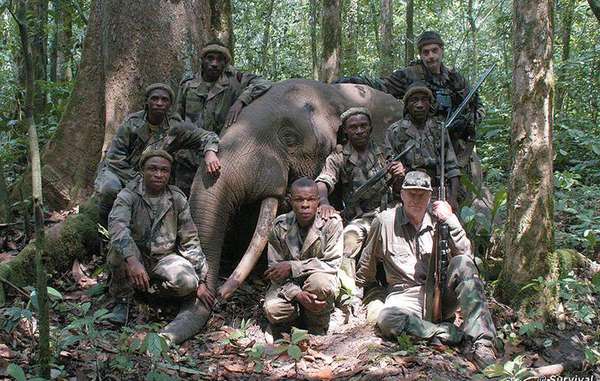
by Deep Green Resistance News Service | Nov 2, 2016 | Biodiversity & Habitat Destruction, Colonialism & Conquest
Featured image: World Wildlife Fund trustee Peter Flack with dead forest elephant. © Survival International
by Survival International
Survival International has learned that an elephant-hunting safari operation jointly owned by a French billionaire has been implicated in human rights abuses against local Baka “Pygmies” and their neighbors, including illegal evictions and torture.
The operation is based in two “protected areas” in Cameroon, leased by Benjamin de Rothschild. It offers tourists the chance to pay €55,000 to shoot a forest elephant.
Baka were evicted from their ancestral land to create the trophy hunting operation, contrary to international law. It is patrolled by soldiers, police and armed guards, and Baka have now been told they will be shot on sight if they cross it to hunt to feed their families, gather plants, or visit religious sites.
The Baka report that three of their forest camps have been burnt by wildlife guards and safari camp employees in the last year alone. Baka men hunting for food in this forest have been beaten by local police, soldiers and wildlife guards.

Benjamin de Rothschild, joint owner of a luxury elephant-hunting operation on Baka land
© JeuneAfrique
One Baka man told Survival: ”They told me to carry my father on my back. I started walking, [the guard] beat me, he beat my father. For three hours, every time I cried out they would beat me, until I fainted and fell to the ground with my father.”
Another Baka man said: “When the trophy-hunting company finds us here they burn the camps. They beat us, they search for us, they set their dogs on you, their guns on you.”
A third Baka said: “The trophy-hunting company said that if they see anyone [in the forest] bullets will fly. Now those who have family there have gone to get them out. How will we live now?”
Survival contacted Mr. de Rothschild informing him of reports of serious human rights abuses having been committed to maintain the trophy-hunting operation, but has received no reply.
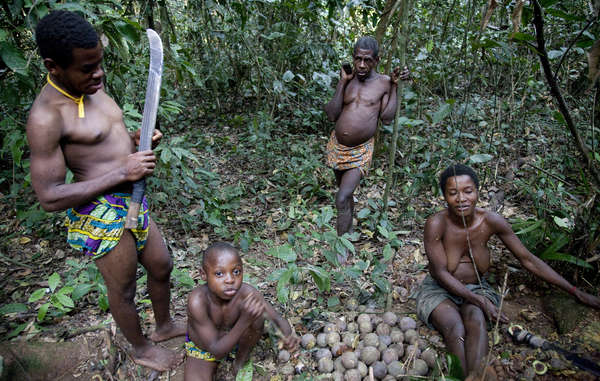
The Worldwide Fund for Nature (WWF) is very active in Cameroon, and the trophy-hunting “protected areas” form part of one of their key “conservation landscapes.” WWF has yet to comment on the allegations, or say whether it proposes to take any action.
One booking operator told Survival that: “All our luxurious fully equipped forest camps are solid construction, air conditioned with private chalets with full bathrooms and dressing parlors. Delicious multi-course cuisine is served with top shelf European wines and beverages… Our newest forest camp has a large screened in swimming pool.”
Watch: Baka plead for forest guards to leave them in peace.
© Survival International
Across the region, Baka “Pygmies” and their neighbors are being evicted from their ancestral homelands and face arrest and beatings, torture and even death while big game trophy-hunting is encouraged. WWF trustee Peter Flack has also hunted elephants in the region.
Survival’s Director Stephen Corry said: “Across Africa, rich trophy hunters are welcomed into the same areas where tribal hunters are illegally evicted from their ancestral homelands and brutalized for hunting to feed their families. This has to stop. Conservation in the Congo Basin is land theft, a continuation of colonialism. It leads to widespread and horrific human rights violations, including extrajudicial killing. Why are so few people speaking out? Survival is leading the fight against these abuses. Conservationists must respect human rights like everyone else is supposed to.”
Click here to find out more and take action.
This is not an isolated incident. Across Africa, tribal people are accused of “poaching” because they hunt to feed their families. And they face arrest and beatings, torture and death, while big game trophy hunters are encouraged. Survival International is leading the fight against these abuses.
Note: “Pygmy” is an umbrella term commonly used to refer to the hunter-gatherer peoples of the Congo Basin and elsewhere in Central Africa. The word is considered pejorative and avoided by some tribespeople, but used by others as a convenient and easily recognized way of describing themselves.
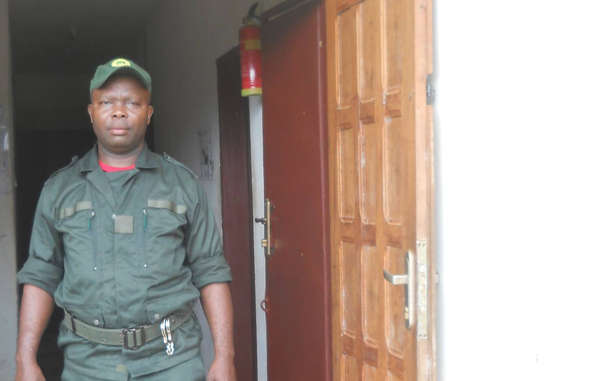
by Deep Green Resistance News Service | Jun 14, 2016 | Biodiversity & Habitat Destruction
Featured image: Cameroonian “ecoguard” Mpaé Désiré, who in 2015 was accused of beating Baka and in 2016 was arrested for involvement in the illegal wildlife trade. © Facebook
A new UN report has confirmed that corrupt officials are at the heart of wildlife crime in many parts of the world, rather than terrorist groups or tribal peoples who hunt to feed their families.
The reports’ findings have coincided with a wave of arrests of wildlife officials across Africa and Asia, raising concerns of a global “epidemic” of poaching and corruption among armed wildlife guards who are supposed to be protecting endangered species.
Recent conservation corruption arrests include:
-A wildlife guard in Cameroon, Mpaé Désiré, and a local police chief who were arrested on suspicion of involvement in the illegal ivory trade on the ancestral land of the Baka “Pygmies” and other rainforest tribes. Mr Mpaé has been accused by Baka of beating up tribespeople and torching one of their forest camps after accusing them of poaching.
The World Wildlife Fund (WWF) has been funding wildlife guards in this part of Cameroon since at least 2000, despite reports of guards arresting, beating and torturing tribal hunters.
One Baka man told Survival in 2013: “Ecoguards used to open tins of sardines and leave them as bait to attract leopards, so they could hunt them for their skins.”
Another said: “The ecoguards don’t want anyone in the forest at all so that no one hears the gunshots as they poach.”
Elsewhere:
– Four park employees in India have been arrested for involvement in poaching endangered one-horned rhinos in the notorious Kaziranga reserve, where wildlife guards are encouraged to shoot on sight anyone they suspect of poaching. 62 people have been killed there in just nine years.
– A forest officer has been arrested near Kaziranga after police found a tiger skin and ivory in his house.
– In the Pench tiger reserve in central India, a guard, named in reports as Vipin Varmiya, has been arrested for killing a tiger and her two cubs.
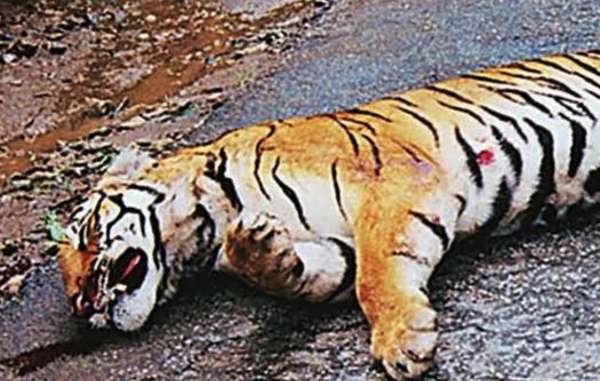
A tiger was allegedly killed by a park guard in Pench tiger reserve, India © Survival International
A recent Brookings Institution Report confirmed that the big conservation organizations are failing to tackle the true poachers – criminals conspiring with corrupt officials. The link between corruption and wildlife crime has also been reported in Tanzania, South Africa, Kenya, Zimbabwe, Uganda and Indonesia.
The involvement of armed guards in poaching, in countries where militarized conservation tactics are employed, raises questions over the advisability of using violence and intimidation to protect flora and fauna. In many parts of the world, armed conservation has led to violence against local tribal peoples, including in Cameroon, and in India where summary execution in the name of conservation is in danger of becoming more widespread.
In February 2016, Survival filed an OECD complaint against the World Wildlife Fund (WWF) for its involvement in funding repressive and often violent conservation projects in southeast Cameroon, rather than tackling the real poachers. Persecuting the environment’s best allies in place of real action to tackle these systemic problems is harming conservation.
Survival’s Director Stephen Corry said: “Conservation’s response to poaching has been to accuse local tribespeople when they hunt to feed their families, to support the use of shoot-to-kill policies and to blame terrorists. None of it works; it’s harming conservation. The true poachers are the criminals, including ecoguards, who conspire with corrupt officials. As the big conservation organizations partner with industry and tourism, they’re harming the environment’s best allies, the tribal peoples who have been dependent on and managed their environments for millennia. Tribespeople should be at the forefront of the environmental movement, they know who the poachers actually are, they can protect their land from logging, they protect biodiversity, and are better at looking after their environment than anyone else.”
Notes: Latest reports indicate Mr Mpaé has been released from custody and is awaiting trial.
“Pygmy” is an umbrella term commonly used to refer to the hunter-gatherer peoples of the Congo Basin and elsewhere in Central Africa. The word is considered pejorative and avoided by some tribespeople, but used by others as a convenient and easily recognized way of describing themselves.
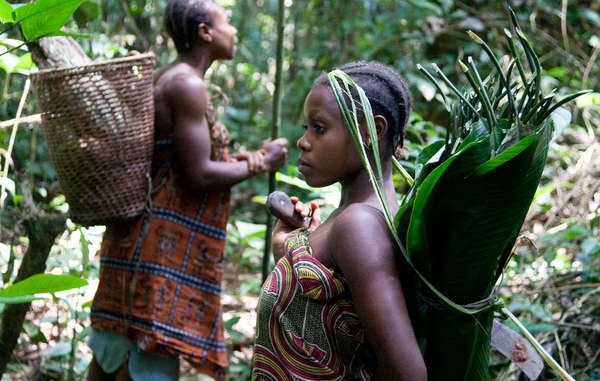
by Deep Green Resistance News Service | Feb 16, 2016 | Lobbying
Featured image: The Baka have lived sustainably in the central African rainforest for generations as hunter-gatherers
© Selcen Kucukustel/Atlas
By Survival International
Survival International has launched a formal complaint about the activities of the World Wide Fund for Nature (WWF) in Cameroon.
This is the first time a conservation organization has been the subject of a complaint to the OECD (Organization for Economic Cooperation and Development), using a procedure more normally invoked against multinational corporations. Survival International has launched a formal complaint about the activities of the World Wide Fund for Nature (WWF) in Cameroon.
The complaint charges WWF with involvement in violent abuse and land theft against Baka “Pygmies” in Cameroon, carried out by anti-poaching squads which it in part funds and equips.
Before beginning its work in Cameroon, WWF failed to consider what impact it would have on the Baka. As a result, WWF has contributed to serious human rights violations and broken the United Nations Declaration on the Rights of Indigenous Peoples. It supports conservation zones on Baka land, to which the Baka are denied access, as well as the anti-poaching squads that have violently abused Baka men and women, and other rainforest tribes, for well over a decade.
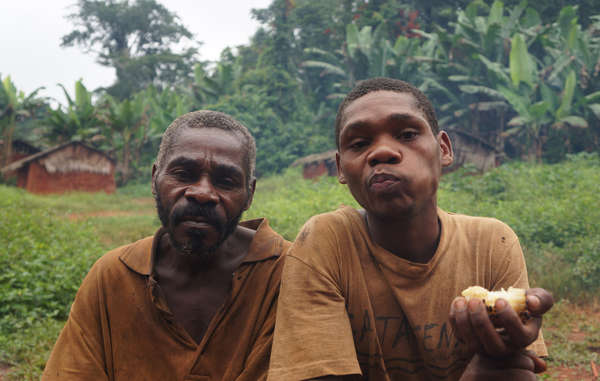
Forced out of the forest, many Baka communities complain of a serious decline in their health. Living on the roadside, they are increasingly exposed to malaria and other diseases.
© Survival International
The international conservation organization has thereby violated both OECD human rights guidelines and its own policy on indigenous peoples, and Survival’s legal team has therefore submitted a formal complaint.
Baka have repeatedly testified to Survival about the activities of these anti-poaching squads in the region. In 2015 one Baka man said: “When they came to beat me here in my home, my wife and I were sleeping. They beat me with machetes. They beat my wife with machetes.”
Survival International is calling for a new approach to conservation that respects tribal peoples’ rights. Tribal peoples have been dependent on and managed their environments for millennia. Despite this, big conservation organizations are partnering with industry and tourism and destroying the best conservationists and guardians of the natural world – tribes. They are the environment’s best allies, and should be at the centre of conservation policy.“They are letting the elephants die out in the forest at the same time as they are stopping us from eating,” another Baka man told Survival. Today, the destruction of Baka land through logging, mining and the trafficking of wildlife continues, provoking concern among tribespeople that their land is being destroyed, even as they are denied access to large parts of it in the name of conservation.
Survival’s Director Stephen Corry said today: “WWF knows that the men its supporters fund for conservation work repeatedly abuse, and even torture, the Baka, whose land has been stolen for conservation zones. It hasn’t stopped them, and it treats criticism as something to be countered with yet more public relations. It calls on companies to stick to the same OECD guidelines it routinely violates itself. Both conservation and development have been allowed to trump human rights for decades and millions of people in Africa and Asia have suffered as a result. It’s time the big conservation organizations got their act together. If WWF really can’t stop the guards it funds in Cameroon from attacking Baka, then perhaps it should be asking itself if it has any right to be there at all.”
Survival International is the global movement for tribal peoples’ rights. We help tribal people defend their lives, protect their lands and determine their own futures. Founded in 1969.
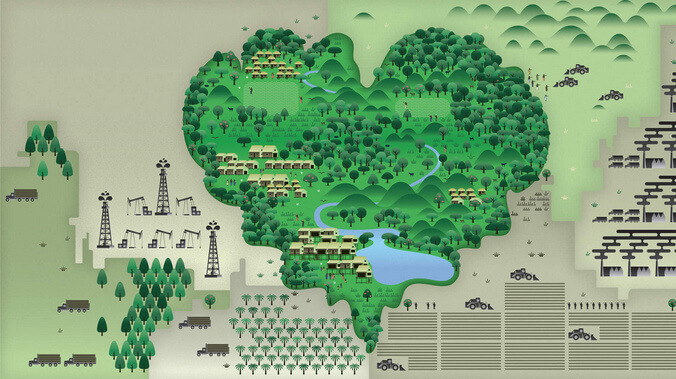
by DGR Colorado Plateau | Oct 7, 2015 | Indigenous Autonomy, The Solution: Resistance
By Intercontinental Cry
Territories of Life is a video toolkit with a purpose. It’s aim: to bring stories of resistance, resilience and hope to indigenous communities on the frontline of the global rush for land.
Produced by our friends at LifeMosaic, a non-profit based in Scotland, the Territories of Life toolkit consists of ten stories that were filmed in communities across Indonesia, Philippines, Guatemala, Ecuador, Colombia, Paraguay, Tanzania and Cameroon.

“The videos in the Territories of Life toolkit share inspirational stories of communities that are successfully organizing to defend their territories and their futures,” reads a press release from LifeMosaic. They include “The story of Maasai indigenous women in Tanzania who used awareness raising, protests and political pressure to lead a movement in defense of their territory; and the Misak indigenous people in Colombia who have developed and are carrying out their Plan de Vida, a long‐term vision for self-determined development.”
The toolkit also includes a few primers on land rights, land grabs, and common tactics that companies use to convince communities to accept and support their projects.
LifeMosaic goes on to say that, “The video toolkit and accompanying facilitators’ guide are intended to support indigenous peoples as they exercise their right to free, prior and informed consent; advocate for their rights; participate more actively in local spatial planning; and draw up village action plans for self‐determined development and for protecting their territories, forests and resources.”
It’s more than mere lip service. LifeMosaic is actively working with hundreds of local partners to facilitate the free distribution of Territories of Life to indigenous communities and supporting organizations around the world.
To order a copy of the toolkit, visit www.lifemosaic.net. If other groups request a DVD, LifeMosaic recommends a donation of $11 (£10). The videos can also be downloaded online at their website.
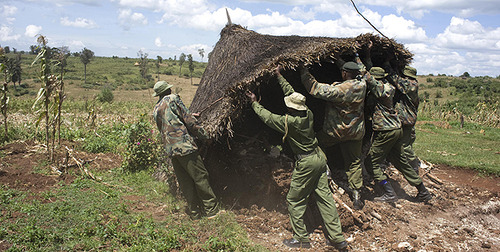
by Deep Green Resistance News Service | Feb 7, 2015 | Colonialism & Conquest, Indigenous Autonomy
By Stephen Corry / Survival International
Twenty years ago, fundraising publicity for the World Wildlife Fund (WWF) posed a very odd question: whether to send in the army or an anthropologist to stop indigenous people destroying the Amazon rainforest. Equally bizarre, it claimed that the media was “inundated with appeals to save native peoples” and asked, “Do they really deserve our support?” The world’s leading conservation organization went on by saying that tribes had learned many things from outsiders, including “greed and corruption.” WWF’s answer to this apparent dilemma was thankfully not the army, but for concerned people to give it more money (its daily income is now $2 million) so it could “work with native peoples to develop conservation techniques.”
At Survival International, we were dismayed, and so were tribal organizations when we showed them the advertisement. For WWF to blame “duped” tribespeople for deforestation was serious enough (giving the impression they trumped conservationists in attracting more funding was laughable), but even mentioning soldiers in the same sentence as conservationists uncomfortably echoed the latter’s dubious roots in colonialist ideology.
However, WWF’s assertions are likely to have raised more eyebrows with its supporters than with many tribal people, for whom big conservation organizations have long been considered in the same bracket as development banks, road and dam builders, miners and loggers. All, they would say, are outsiders bent on stealing tribal lands.
Over the last 20 years, some conservation groups have at least cleaned up their language: Their policies now make claims about working in partnership with local tribal communities, about consulting them and about how much they apparently support UN standards on indigenous rights. There are undoubtedly many in the conservation industry who believe all this, and who realize that tribal peoples are – as a broad principle – just as good conservationists as anyone else, if not considerably better.
Even those who disagree do at least recognize that alienating local people – whether tribal or not – eventually leads to protected areas being opposed and attacked. It’s one reason why the conservation industry makes much, at least on paper, of bringing local communities on board. But apart from written policies, how much have things really changed in the last 20 years? Tragically for many, the answer is “not much”; in some places, they’re getting worse.
“Voluntary Relocation” From Tiger Reserves
For example, the WWF-inspired tiger reserves in India are increasingly used to expel tribes from their forests so they can be opened up to tourism. The people are bribed with a fistful of rupees to give up the land, which has sustained their families for countless generations. More often than not, promises are broken and they’re left with empty pockets and a few plastic sheets for shelter. Whether any financial incentives materialize or not, they are backed up with threats and intimidation: Tribes are repeatedly told that if they don’t get out, their homes and crops will be destroyed and they’ll get nothing. When they finally cave in to this pressure, the conservationists call it “voluntary relocation.” Needless to say, it’s illegal.
It might surprise people to know there’s evidence that tigers thrive in the zones where tribal villages remain – the people’s small open fields encourage more tiger prey than in the enclosed forest. When they’re kicked out, their old clearings give way to roads, hotels and truckfuls of gawping tourists. Studies show animal stress behavior increases with tourism. In other words, if you want happy tigers, then it’s much better to leave the tribal people where they’ve always been. They are surely the best eyes and ears to report any poaching activity anyway; Baiga villagers from the famous Kanha reserve respect the big cats as their “little brothers.”
Hunters or Poachers?
Guards in tiger reserves intimidate and beat tribespeople found on land that was once their ancestral forests. But at least they stop short of the torture to which the Baka “Pygmy” people in Cameroon are subjected by anti-poaching forces. To return to the advertisement: Conservation is sending in soldiers, just as it always has. Heavily armed, government paramilitary squads accompany “ecoguards,” which are equipped using WWF funds. They beat those thought to have entered the protected areas, which are in fact Baka ancestral homelands. Tribespeople are assaulted even if they’re merely suspected of knowing those who have gone in. Meanwhile, their land is logged and mined, including by WWF partners. A Baka man told us, “They beat us at the WWF base. I nearly died.” WWF seems incapable of stopping these abuses. It has known about them for years, but is scathing about those who denounce them: Survival’s “absurd” campaign to draw attention to them would, it claimed, help the “real” criminals.
Tribal victims are invariably accused of “poaching,” a term which now means any sort of hunting, including for food, with which conservationists disagree. That certainly doesn’t encompass all hunting. Many conservation organizations, including WWF, don’t oppose fee-paying big game hunting. On the contrary, they profit from it, even quietly whispering that it’s a vital ingredient in conservation.
Senior environmentalists are not averse to having a shot themselves. The former president of WWF-Spain – the previous king of Spain – was recently photographed in Botswana with his elephant kill. The resulting scandal forced him to step down, but only because the picture was leaked. Kings can hunt elephants, which we’re told are threatened, but Bushmen can’t hunt to eat, not a single one of the plentiful antelope they’ve lived off sustainably since time immemorial. If they’re even suspected of it, they’ll be beaten and tortured like the Baka. This has been going on for decades, as the president of Botswana, Ian Khama, has tried to force all Bushmen out of their Central Kalahari region. In 2014, he banned hunting throughout the country – except for paid safari hunting of course. It was another illegal act in the guise of conservation.
Conservation and Diamond Mining
An avid environmentalist himself, and board member of Conservation International (CI) no less, General Khama claims he wants to clear the zone so that the wildlife will be undisturbed. This is decidedly odd because the fauna has been much disturbed over the last 20 years, but not by the remaining tribespeople: Mining exploration continues apace and you will soon be able to buy a diamond mined from inside the so-called game reserve. Due to go on sale around Valentine’s Day, these expensive love tokens now play a part in the destruction of the last hunting Bushmen in Africa.
In March, Khama is due to host the second United for Wildlife meeting – a consortium of the world’s major conservation organizations, including WWF and CI. A British royal will doubtless turn up and join the cry against “illegal poaching.” The assembly of conservationists, who routinely violate the law in their treatment of tribal peoples, will be hosted by a president guilty of trying to eradicate Bushmen hunters. No doubt the hypocrisy will be lost in the sanctimoniousness with which the press will accord the photo ops. The first United for Wildlife meeting, in London, was also hosted by Princes William and Harry – both had returned the previous day from hunting in Spain.
A couple of years ago, to the southwest of the Central Kalahari Game Reserve diamond mine, another Bushmen community was going to be thrown off their land because they had the temerity to remain where CI had tried to establish a new “wildlife corridor.” CI apparently has good policies, including having to consult the locals, so Survival International asked how it went about consulting with the Bushmen of Ranyane during its long, expensive Botswana study. Although the village is an easy four-hour drive from the nearest big town, CI admitted there had been no attempt to consult at all.
Conservation as a Feel-Good Commodity
If this handful of examples surprises anyone, it’s because the industry has poured enormous resources into gaining a place among the world’s most trusted brands. This long PR exercise has involved blurring and hiding (rather than honestly confronting) conservation’s colonial, indeed racist, past. Conservation has become a commodity, raising enormous sums of money, and rewarding supporters with an equally large feel-good factor, one that is nowhere near as straightforwardly apolitical as we are led to believe. Those who suggest “conservation” might not really be as holy as some claim are routinely denigrated as blasphemers and apostates.
If the movement is to have any chance of achieving its stated objectives – which I, for one, pray it will – it’s vital that it’s scrutinized, questioned and exposed: For conservation casts an ideological opposition of nature versus people that is profoundly damaging to our real relationship with our environment. By doing so, it harms both people and ultimately the environment, too; conservation destroys those who’ve nurtured their surroundings for timeless generations – people who have actually fashioned what we now mistake as natural. It works too often in direct opposition to its own goals.
When experts and researchers point this out, and criticize the industry, its common reaction is to try and silence them. For example, when award-winning German filmmaker and journalist, Wilfried Huismann, conducted a two-year investigation into the WWF, the film he produced, The Silence of the Pandas, was initially blocked through legal injunctions. You can read his book, PandaLeaks, though you won’t find it in mainstream bookstores. WWF’s legal team is very quick off the mark.
But many critics are committed environmentalists themselves. They too want to prevent the world’s most beautiful and diverse regions from being overrun by the industrialization that has destroyed so much and reduced so many people to poverty and dependency. The problem is that the conservation industry is not only failing to achieve this; it can be working in the opposite direction. According to Huismann, WWF is turning a blind eye to the destruction of huge areas in Southeast Asia and South America for biofuel cultivation, requiring millions of gallons of toxic pesticides and herbicides.
Tribal Peoples Are the Best Conservationists
If the conservation conglomerates really are to start preventing the further industrialization of these vital ecosystems, they surely must first remove giant polluters like Monsanto and BP from their own boards. Conservation has to stop the illegal eviction of tribal peoples from their ancestral homelands. It has to stop claiming tribal lands are wildernesses when they’ve been managed and shaped by tribal communities for millennia. It has to stop accusing tribespeople of poaching when they hunt to feed their families. It has to stop the hypocrisy in which tribal people face arrest and beatings, torture and death, while fee-paying big game hunters are actively encouraged.
The WWF publicity concluded, “Enough is enough” – I agree; it’s time for change. It’s obviously too late for those peoples whom conservation has killed, but what’s still going on today is illegal, immoral and does not deserve public support. Conservation has to wake up to the fact that tribal peoples are better at looking after their environment than anyone else.
Despite the millions pouring into the conservation industry daily, the environment remains in deepening crisis. It’s time to realize that there is a better way. Firstly, tribal rights have to be acknowledged and respected – are they not people too? Secondly, they have to be treated as the best experts at defending their own land. Thirdly, conservationists must realize it’s they, themselves, who are the junior partners here, not the tribespeople.
The real creators of the world’s national parks are not the ideologues and evangelists of the environmental movement, but the tribal peoples who fashioned their landscapes with knowledge and understanding accumulated over countless generations.
From TruthOut: http://www.truth-out.org/news/item/28888-wildlife-conservation-efforts-are-violating-tribal-peoples-rights










